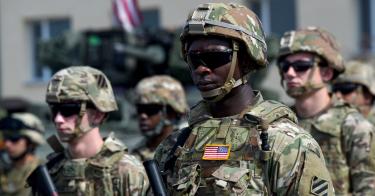Hard questions about the many things our government spends money on are common even in good times. And in a time of pandemic, those questions only get louder and more persistent. So it’s no surprise that the defense budget is coming under increasing scrutiny. The editorial pages of news outlets are awash in calls to reduce spending and cut military funding.
Many commentators cite the increasing utility of technologies like robotics and artificial intelligence. With these, they contend, a small military can be more effective. But this reveals a lack of understanding about just what it takes for any security force to do its job, let alone the way security affairs work in the real world.
Imagine you’re a small-business owner and you’ve decided you need 24-hour security. You could try to employ your ne’er-do-well nephew—he needs a job, and he comes cheap. But he hasn’t had any real training for something like this.
The fact is, you get what you pay for. Having relevant skills, good training and an understanding of what to do and when are essential to the job. But these cost money up front and a sustained commitment after the initial investment.
That’s why smart employers are inclined to search for a person who demonstrates a willing spirit and aptitude for the job. You want the person to have skills, training, competency and all of the rest, but you will also have to offer incentives that lead this attractive candidate to take your job instead of someone else’s.
Even if it all works out—you find that special someone willing to do the work and who proves up to the challenge—he or she is only one person, and can’t be there all the time.
So you need several people for that one task. Three people could divide the work into eight-hour shifts, but that would still require all three to be available all year long with no time off for vacation or to account for illness, or other events. The reality quickly shows that four or maybe even five people are needed to keep your establishment secure 24/7.
Now imagine you have a larger place and need more than one guard. The numbers quickly increase. Sure, technology like cameras or robots can help, but at some point, a real person has to respond. Tech hasn’t yet replaced humans.
So we see that, in the world of security, numbers matter. The same goes for military affairs. If Americans want their interests protected abroad, their country protected at home, friends reassured that we’ll be there for them in a crisis, and competitors deterred from actions that harm or threaten to harm the foregoing, then we need military services with sufficient capacity to conduct meaningful military actions in more than one place at a time.
Like it or not, the world is a big place. It takes time and a great deal of effort to move a force from one place to another and to sustain it in operations over any meaningful period of time.
Now imagine what might be needed if as is the case in combat, enemy forces are doing all they can to kill your people, destroy your equipment and disrupt the support measures you need to have in place to achieve your objective. If you cannot quickly replace losses and bring forces to bear against the enemy from more than one direction of attack, you risk losing the fight and suffering consequences that resonate far beyond the immediate battlefield.
At present, our military is just large enough to respond to a single major crisis in one region. The U.S. maintains very small portions of the force in many regions to work with our partners, to keep an eye on competitors, and maintain firsthand awareness of conditions as they change over time—and to make it possible for other forces to flow to a region should a crisis erupt. But these outposts of American power and influence do not constitute what would be needed to win a conflict.
Further, their small size is aggravated by the lack of defense investments by our friends, the significant investments being made by our adversaries, and the vast distances reinforcements would have to travel from their home bases in the United States. A small U.S. presence wouldn’t be so bad if our partners were more capable or our potential enemies were less so, but the trends are very much in the wrong direction on both counts.
Our forces are too small for the tasks we assign to them, our expectations for what we want them to do, and world they help to shape in ways that serve America’s interests here at home. Budget decisions affecting the military in 2021 and beyond must receive their due priority—because without security, none of the other things we want to accomplish at home or abroad are possible.
This piece originally appeared in the Washington Times



